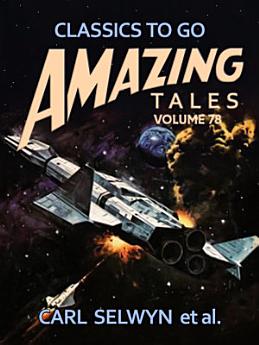Amazing Tales Volume 78
Jan 2025 · CLASSICS TO GO Book 78 · Otbebookpublishing
Ebook
128
Pages
family_home
Eligible
info
reportRatings and reviews aren’t verified Learn More
About this ebook
Embark on an extraordinary odyssey with "Amazing Tales Volume 78", a spellbinding science fiction anthology that transcends the boundaries of imagination. This compilation is a gateway to thrilling adventures, interstellar skirmishes, and profound existential quests that will leave readers on the edge of their seats. Step into the icy void of Selwyn's "Earth Is Missing!", where detective intrigue meets monstrous hazards against a backdrop of a chilling dystopian future. Witness the tangible tension in Henry Guth's "Signal Red", as an intrepid spacefarer confronts the vastness of the cosmos and the depths of his own fate. Travel through the cosmic continuum with Basil Wells' "Scrambled World", a masterclass in time-bending exploration, and lose yourself in the enigmatic beauty of "Among the Scented Ones", where survival and identity are tested on an untamed alien world. Prepare for a whirlwind of laughter in William Tenn's "Me, Myself and I", where an unexpected protagonist uses humor to navigate the complexities of time travel, endeavoring to save humanity's destiny with a mischievous twinkle in his eye. Face the gripping urgency of an alien siege in W. Bradford Martin's "Spoilers of the Spaceways", a tale of invasion that stokes the fires of resistance and resilience. At the heart of this anthology are themes of perseverance, self-discovery, and that indefatigable human spirit, woven through a vibrant tapestry of narratives. With contributions from sci-fi luminaries, "Amazing Tales Volume 78" showcases the unique voices that define the genre, offering both seasoned aficionados and curious newcomers an unforgettable voyage across the stars. Delve into a universe of wonder and introspection, where every story is a new adventure waiting to be discovered. Let "Amazing Tales Volume 78" transport you to realms of possibility and wonder that lie just beyond our reach.
About the author
Carl Selwyn, born in 1898 in the bustling industrial city of Pittsburgh, Pennsylvania, emerged as a pioneering voice in early 20th-century speculative fiction. A child of the Gilded Age, Selwyn's works often reflected the rapid technological advancements and societal shifts of his time. His fascination with the potential of science and the mysteries of the universe led him to explore themes that were both groundbreaking and controversial.Selwyn's literary career took off in the 1920s, a period marked by the Jazz Age's exuberance and the looming shadow of the Great Depression. He was a contemporary of literary giants like H.P. Lovecraft and Isaac Asimov, yet he carved out a unique niche with his blend of scientific curiosity and philosophical inquiry. His stories frequently delved into the ethical implications of technological progress, a topic that resonates profoundly with today's readers in our tech-driven world.One of Selwyn's most notable contributions was his early advocacy for the ethical use of technology, a revolutionary idea during an era enamored with industrial progress. His foresight into issues such as artificial intelligence and genetic engineering has earned him posthumous recognition as a visionary. Selwyn's influence is evident in the works of contemporary science fiction authors who grapple with similar themes of morality and innovation.Despite his forward-thinking ideas, Selwyn was not without controversy. His outspoken views on the potential dangers of unchecked technological advancement often put him at odds with the more optimistic perspectives of his peers. This tension, however, only fueled his creative output, resulting in a body of work that continues to inspire and provoke thought.Carl Selwyn's legacy is one of intellectual bravery and imaginative foresight. His ability to weave complex scientific concepts with deep ethical questions makes his work timeless, offering modern readers a window into the anxieties and aspirations of a bygone era while remaining strikingly relevant today.
Rate this ebook
Tell us what you think.
Reading information
Smartphones and tablets
Install the Google Play Books app for Android and iPad/iPhone. It syncs automatically with your account and allows you to read online or offline wherever you are.
Laptops and computers
You can listen to audiobooks purchased on Google Play using your computer's web browser.
eReaders and other devices
To read on e-ink devices like Kobo eReaders, you'll need to download a file and transfer it to your device. Follow the detailed Help Center instructions to transfer the files to supported eReaders.








